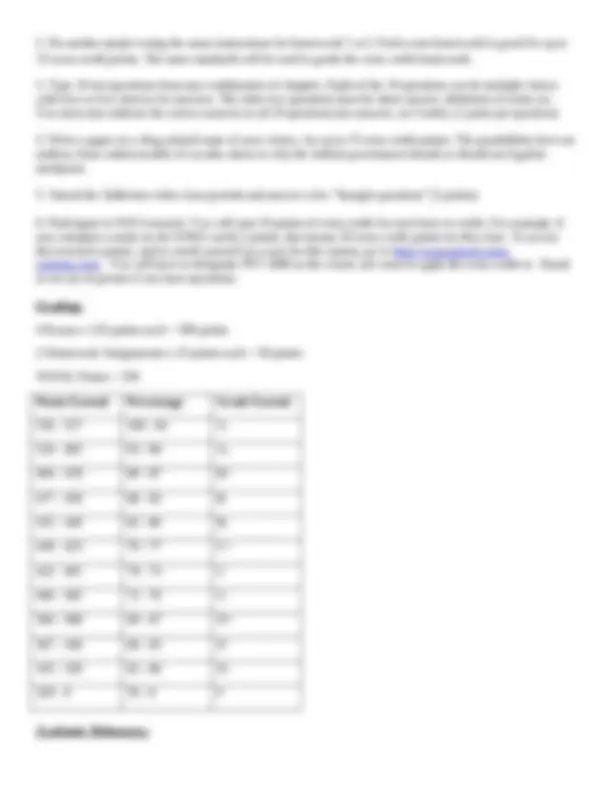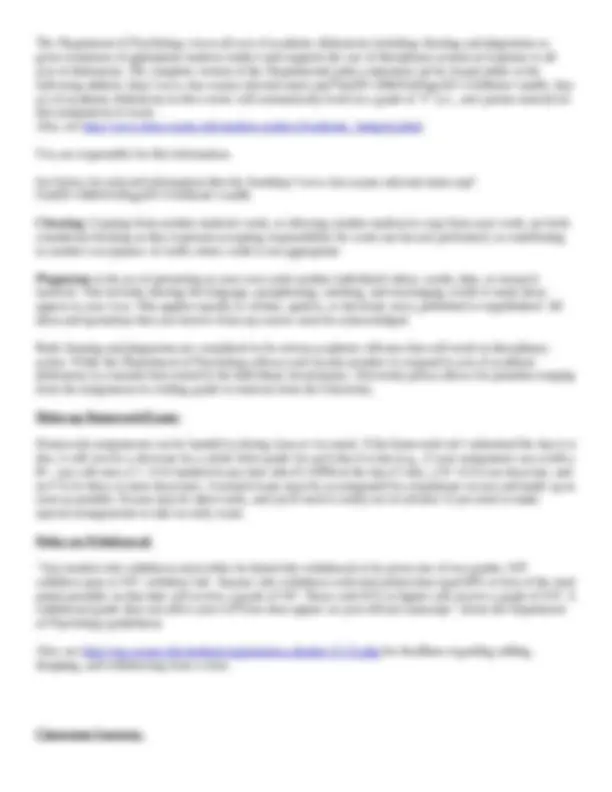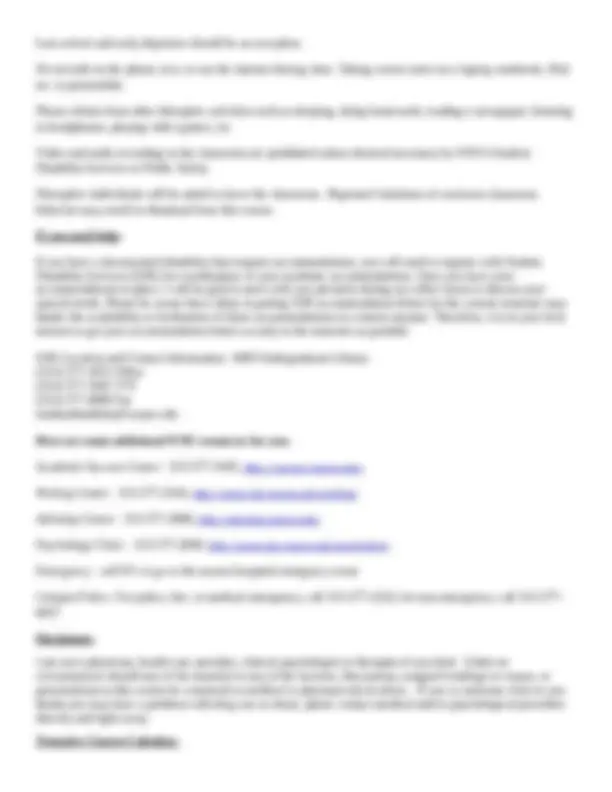





Study with the several resources on Docsity

Earn points by helping other students or get them with a premium plan


Prepare for your exams
Study with the several resources on Docsity

Earn points to download
Earn points by helping other students or get them with a premium plan
Community
Ask the community for help and clear up your study doubts
Discover the best universities in your country according to Docsity users
Free resources
Download our free guides on studying techniques, anxiety management strategies, and thesis advice from Docsity tutors
Material Type: ClassMaterial; Professor: Nowak; Class: Int: Drgs Bhvr&Socty; Subject: Psychology; University: Wayne State University;
Typology: Lecture notes
1 / 6

This page cannot be seen from the preview
Don't miss anything!




Psychology 2080 – Introduction to Drugs, Behavior, and Society Winter 2012 Instructor: Nicole T. Nowak E-mail: at3125@wayne.edu Phone: (313) 664-2648 Office: Skillman Building, Basement 09 Office Hours: Wednesdays 2:00 - 4:00 and by appointment The Skillman Building is located at the corner of Palmer and John R, and is locked at all times. You'll need to dial "02" to ring my office and I'll let you in, or call (313) 664-2648. Course Meeting Time and Location: Lecture: Wednesday evening 5:30 – 8:15 State Hall 134 Course Materials: Hart, C. L., & Ksir, C. (2011). Drugs, Society & Human Behavior (14th edition). McGraw-Hill ISBN 978-0-07-338090-2. The 13th edition will also work. 4 green Scantron forms and a pencil for exams You will need access to Blackboard (http://blackboard.wayne.edu) in order to view the online grade book, course materials, and announcements. This means that your WSU access ID must be active. Email will be sent to your access ID address. Course Objectives: The primary objective of this course is for students to acquire introductory knowledge of stimulants, depressants, opioids, hallucinogens, and cannabis. Selected over the counter drugs, dietary supplements, steroids, and drugs used to treat mental illness will also be discussed. Students will be instructed with the following objectives regarding these drugs: mechanism of action; behavioral and physiological effects; dependence potential; clinical applications; and prevalence of use in the United States. A secondary objective of this course is for students to interpret graphs and figures related to the course material. A tertiary objective is for students to become familiar with reading and summarizing scientific journal articles related to the course material. Exams: There will be four exams in this course, including the final. The first part of each exam will be 50 multiple choice questions at 2 points each; while the second part will require 25 points of short answer, definition of terms, and/or answering questions about figures. If you are scheduled to take more than two final exams on April 25th, and would like to arrange to take the exam for this class at an earlier time, we need to discuss this by April 18th.
Homework: There will be two homework assignments in this course. Homework can be submitted in person or via email. Homework # Find a drug-related empirical article in a scientific journal (use psycINFO or MEDLINE databases from WSU library) that you are personally interested in, read it a few times, and summarize the main sections (i.e., introduction, methods, results, discussion/conclusion/summary @ 5 points each). Also point out strengths and weaknesses of the paper, from your own educated perspective (5 points). When you turn this in, also include a copy of the journal article. If the article doesn't accompany your homework assignment, you'll fail the assignment. Homework # Think of a song or movie that relates to drug use, then...
The Department of Psychology views all acts of academic dishonesty including cheating and plagiarism as gross violations of appropriate student conduct and supports the use of disciplinary actions in response to all acts of dishonesty. The complete version of the Departmental policy statement can be found online at the following address: http://www.clas.wayne.edu/unit-inner.asp?UnitID=20&WebPageID=1142&site=candle.Any act of academic dishonesty in this course will automatically result in a grade of ‘F’ (i.e., zero points earned) for that assignment or exam. Also, see http://www.doso.wayne.edu/student-conduct/Academic_Integrity.html. You are responsible for this information. See below for selected information directly fromhttp://www.clas.wayne.edu/unit-inner.asp? UnitID=20&WebPageID=1142&site=candle Cheating: Copying from another student's work, or allowing another student to copy from your work, are both considered cheating as they represent accepting responsibility for work one has not performed, or contributing to another's acceptance of credit where credit is not appropriate. Plagiarism is the act of presenting as your own work another individual's ideas, words, data, or research material. This includes altering the language, paraphrasing, omitting, and rearranging words to make them appear as your own. This applies equally to written, spoken, or electronic texts, published or unpublished. All ideas and quotations that you borrow from any source must be acknowledged. Both cheating and plagiarism are considered to be serious academic offenses that will result in disciplinary action. While the Department of Psychology allows each faculty member to respond to acts of academic dishonesty in a manner best suited to the individual circumstance, University policy allows for penalties ranging from the assignment of a failing grade to removal from the University. Make-up Homework/Exam: Homework assignments can be handed in during class or via email. If the homework isn’t submitted the day it is due, it will receive a decrease by a whole letter grade for each day it is late (e.g., if your assignment was worth a B+, you will earn a C+ if it's handed in any time after 8:15PM on the day it’s due, a D+ if it's two days late, and an F if it's three or more days late). A missed exam must be accompanied by a legitimate excuse and made up as soon as possible. Exams may be taken early, and you'll need to notify me in advance if you need to make special arrangements to take an early exam. Policy on Withdrawal: "Any student who withdraws must either be denied the withdrawal or be given one of two grades, WP: withdraw pass or WF: withdraw fail. Anyone who withdraws with total points that equal 60% or less of the total points possible on that date will receive a grade of WF. Those with 61% or higher will receive a grade of WP. A withdrawal grade does not affect your GPA but does appear on your official transcript.” (from the Department of Psychology guidelines) Also, see http://reg.wayne.edu/students/registration-calendar-11-12.php for deadlines regarding adding, dropping, and withdrawing from a class. Classroom Courtesy:
Late arrival and early departure should be an exception. Do not talk on the phone, text, or use the internet during class. Taking course notes on a laptop, notebook, iPad etc. is permissible. Please refrain from other disruptive activities such as sleeping, doing homework, reading a newspaper, listening to headphones, playing video games, etc. Video and audio recording in the classroom are prohibited unless deemed necessary by WSU's Student Disability Services or Public Safety. Disruptive individuals will be asked to leave the classroom. Repeated violations of courteous classroom behavior may result in dismissal from this course. If you need help: If you have a documented disability that requires accommodations, you will need to register with Student Disability Services (SDS) for coordination of your academic accommodations. Once you have your accommodations in place, I will be glad to meet with you privately during my office hours to discuss your special needs. Please be aware that a delay in getting SDS accommodation letters for the current semester may hinder the availability or facilitation of those accommodations in a timely manner. Therefore, it is in your best interest to get your accommodation letters as early in the semester as possible. SDS Location and Contact Information: 1600 Undergraduate Library (313) 577-1851 Office (313) 577-3365 TTY (313) 577-4898 Fax studentdisability@wayne.edu Here are some additional WSU resources for you: Academic Success Center: 313-577-3165; http://success.wayne.edu/ Writing Center: 313-577-2544; http://www.clas.wayne.edu/writing/ Advising Center: 313-577-2680; http://advising.wayne.edu/ Psychology Clinic: 313-577-2840; http://www.clas.wayne.edu/psychclinic/ Emergency: call 911 or go to the nearest hospital emergency room Campus Police: For police, fire, or medical emergency, call 313-577-2222; for non-emergency, call 313-577- 6057 Disclaimer: I am not a physician, health care provider, clinical psychologist or therapist of any kind. Under no circumstances should any of the material in any of the lectures, discussions, assigned readings or essays, or presentations in this course be construed as medical or pharmaceutical advice. If you or someone close to you thinks you may have a problem with drug use or abuse, please contact medical and/or psychological providers directly and right away. Tentative Course Calendar: